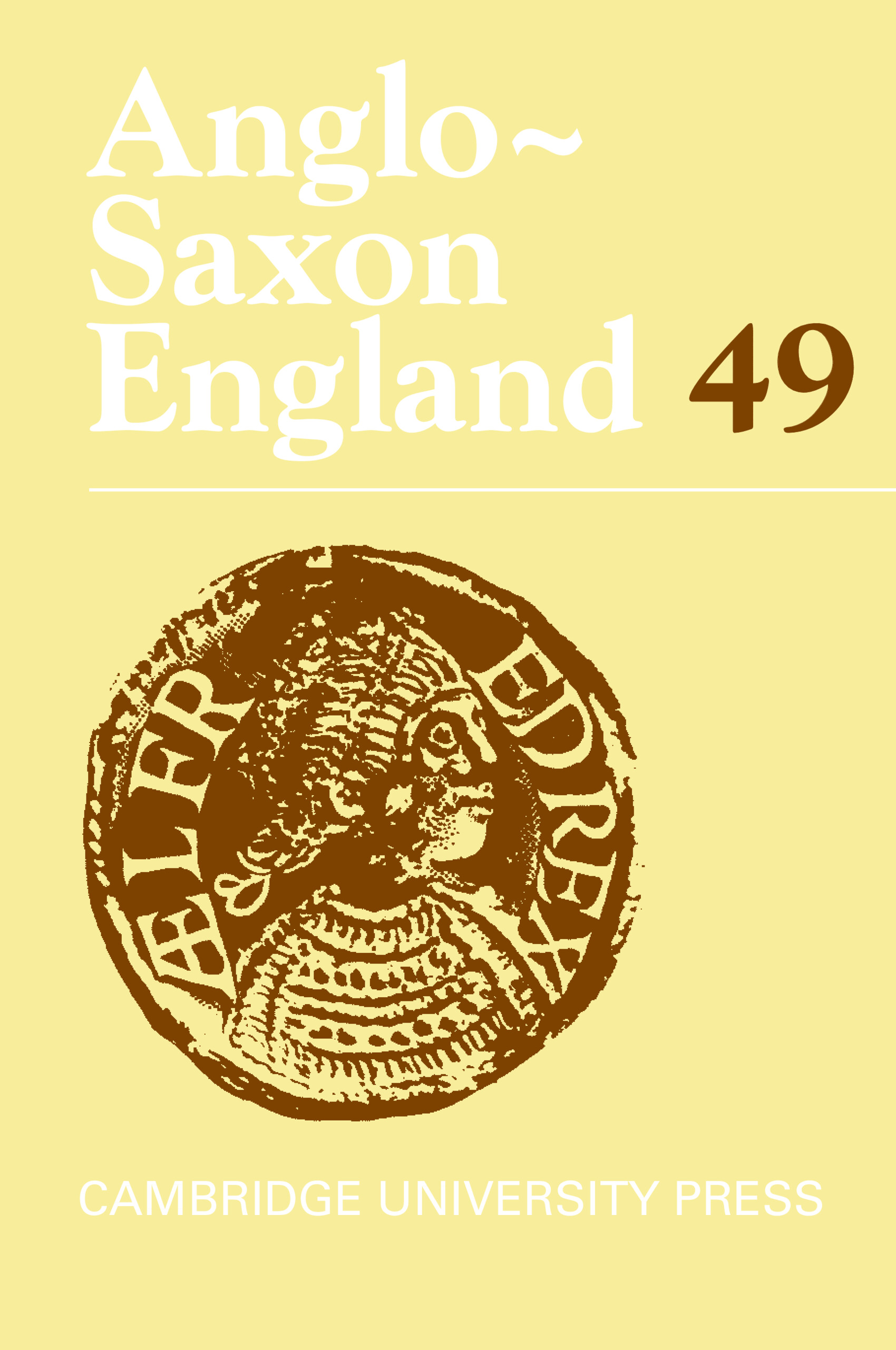Article contents
A friwif locbore revisited
Published online by Cambridge University Press: 26 September 2008
Extract
Chapter 73 of the laws ‘þe Æðelbirht cyning asette on Agustinus dæge’ reads ‘Gif friwif locbore leswæs hwæt gedeþ, xxx sell' gebete.’ The sole manuscript evidence for the laws of Æthelberht is in the early-twelfth-century Textus Roffensis; since this is so late, the manuscript word division is not necessarily significant. For what it is worth, two of the three crucial words are written locbore and les wæs, but it is not absolutely clear whether friwif is intended as one word or two. The elements are divided by the smallest of spaces. Friwif and locbore do not occur elsewhere in the laws; les wæs occurs also at Æthelberht, ch. 3, written lyswæs. Comparatively recent texts and translations can be found in editions of the Anglo-Saxon laws by Thorpe, Liebermann and Attenborough, and, translation only, in Dorothy Whitelock's English Historical Documents (probably the most widely used and certainly the most readily accessible of the four). The earliest of these editors, Thorpe, avoids the difficulties by leaving certain problematical words in the original: ‘If a free-woman loc-bore commit any leswe let her make a bot of xxx shillings.’ Liebermann offers: ‘Wenn eine Freie, eine Lockenträgerin, etwas Unzüchtiges thut, büsse [ihr Schander ihrem Vormunde] 30 Schll’, where, as Attenborough subsequently and charmingly explains, ‘Liebermann understands as the subject of gebete not the woman, but the man with whom she misconducts herself.’ Attenborough's own translation agrees grammatically with Thorpe's: ‘If a freeborn woman, with long hair, misconducts herself, she shall pay 30 shillings as compensation.’ Whitelock has a minor variant: ‘If a freewoman, with long hair, commits any misconduct, she is to pay 30 shillings compensation.’
- Type
- Research Article
- Information
- Copyright
- Copyright © Cambridge University Press 1984
References
1 Ker, N. R., Catalogue of Manuscripts Containing Anglo-Saxon (Oxford, 1957)Google Scholar, no. 373.
2 Friwif is obviously particularly difficult to check since any editor or dictionary might assume an occurrence of it to be adjective plus noun. But in so far as I have been able to ascertain from A Microfiche Concordance to Old English, ed. Healey, Antonette diPaolo and Venezky, Richard L. (Toronto, 1980)Google Scholar, the combination does not occur.
3 Thorpe, B., Ancient Laws and Institutes of England (London, 1840) 1, 20Google Scholar; Die Gesetze der Angelsächsen, ed. Liebermann, F. (Halle, 1903–1916) 1, 7Google Scholar; The Laws of the Earliest English Kings, ed. Attenborough, F. L. (Cambridge, 1922), p. 14Google Scholar; and English Historical Documents c. 500–1042, ed. Whitelock, Dorothy, 2nd ed. (London, 1979), p. 393Google Scholar. I have not found any fundamental disagreements about the translation, or substantial additional information, in any other edition of the laws.
4 Stenton, F. M., ‘The Historical Bearing of Place-Name Studies: the Place of Women in Anglo-Saxon Society’, TRHS 4th ser. 25 (1943), 1–13.Google Scholar
5 Anglo-Saxon Wills, ed. Whitelock, Dorothy (Cambridge, 1930), nos. 37 and 38.Google Scholar
6 Ibid. no. 21.
7 Hickes, George, Linguarum Vett. Septentrionalium Thesaurus Grammatico-Criticus et Archæologicus (Oxford, 1703–1705)Google Scholar, pt iv [Dissertatio Epistolaris], 91.
8 Grimm, Jacob, Deutsche Rechtsaltertümer (repr. Leipzig, 1922) 1, 612.Google Scholar
9 Liebermann, , Gesetze 11, 570Google Scholar, and Vigfússon, Gudbrand and Powell, F. York, Corpus Poeticum Boreale (Oxford, 1883) 11, 476.Google Scholar
10 The Exeter Book, ed. Krapp, G. P. and Dobbie, E. van K., The Anglo-Saxon Poetic Records 3 (New York, 1936), 235Google Scholar (no. 80), and The Old English Riddles of the Exeter Book, ed. Williamson, Craig (Chapel Hill, NC, 1977), p. 111Google Scholar (no. 76).
11 Exeter Book, ed. Krapp and Dobbie, p. 186 (no. 12), and Old English Riddles, ed. Williamson, p. 74 (no. 10).
12 Exeter Book, ed. Krapp and Dobbie, p. 3, line 19.
13 Ibid. p. 134, lines 13–14.
14 Ibid. p. 224, line 3. In my first version of this paper I had a further paragraph on the interesting compound locweard, before I realized that this was an invention of the Microfiche Concordance, where it has replaced the manuscript reading lecweard.
15 Caeghiorde glosses clavicularius in Cambridge, Corpus Christi College 144, 17r: see Lindsay, W. M., The Corpus Glossary (Cambridge, 1921), p. 41.Google Scholar The word is omitted from the Microfiche Concordance.
16 Hawkes, Sonia Chadwick, ‘The Dating and Social Significance of the Burials in the Polhill Cemetery’, Philp, Brian, Excavations in West Kent 1960–1970 (Dover, 1973), pp. 186–201, at 195.Google Scholar
17 Liebermann, , Gesetze 1, 362–4Google Scholar; and cf. Ine, ch. 7 (Ibid. p. 92).
18 Exeter Book, ed. Krapp and Dobbie, p. 163, line 187, and The Exeter Book Part II, ed. Mackie, W. S., EETS o.s. 194 (London, 1934), 44–5Google Scholar. Shippey, T. A., Poems of Wisdom and Learning in Old English (Cambridge, 1976), pp. 72–3 and 134Google Scholar, re-translates the passage to suit his assumption that the matter under discussion is board-games, a topic ‘which has occupied (the poet) intermittently since line 45 [ed. Krapp and Dobbie, line 181]’. Shippey's use of the word ‘intermittently’ may be construed to mean that, if his interpretation of lines 53 ff. is accepted, the poet has in these lines reverted to a topic which previously occupied him in lines 45–8.
19 The Vercelli Book, ed. Krapp, G. P., The Anglo-Saxon Poetic Records 2 (New York, 1932), 37Google Scholar, line 1220.
20 Pokorny, J., Indogermanisches etymologisches Wörterbuch (Bern, 1959–1969) 1, 682.Google Scholar
21 The Gospel according to Saint Mark, ed. Skeat, Walter W. (Cambridge, 1871), p. 31Google Scholar: loswist (Lindisfarne Gospels) and losewest (Rushworth Gospels).
22 Auðunar þáttr in Vestfirðinga sögur, ed. Þórólfsson, Björn K. and Jónsson, Guðni, Íslenzk Fornrit 6 (Reykjavík, 1943), 363–4.Google Scholar
23 I am very grateful to Simon Keynes, Alan Prichard, Leslie Webster and Patrick Wormald for reading this through and advising me on various matters.
- 3
- Cited by


